Section A-2
Unit2SectionA1a-2d课件人教版七年级英语上册

/ðɪs/
These are Peppa's_b__ro_t_h_e_r_s_.
/ðiːz/
兄弟们
That is Peppa's__fr_i_e_n_d_(_朋__友__)__.
/ðæt/
Those are Peppa's__f_r_ie_n_d__s_.
/ðəʊz/
朋友们
Match the words with the people in
A: And what’s her name?
B: Her name is …
Gina
Jenny
Mary
Jim
Alan
IIssIshhheeeDCLehunegnHCHanhe?ao? YNYeoes,s,h,heheeisiisns.'.t.
Is he …? Yes, he is. No, he is not (he isn’t).
1. mother
a
the picture.
2. father
c
3. parents
b
4. brothers
h
5. grandmother f
e
6. grandfather
i
7. friend
d
8. grandparents
g
9. sister
Listen and circle the words you hear in 1a. 1. mother 2. father 3. parents 4. brothers 5. grandmother 6. grandfather 7. friend 8. grandparents 9. sister
Section A-2
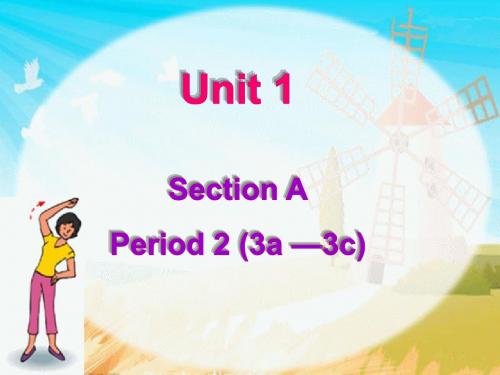
注意: 感官动词 see, watch, observe, notice, hear, look at, listen to, smell, taste, feel +doing 表示 动作的连续性、进行性 感官动词 see, watch, observe, notice, hear, look at, listen to, smell, taste, feel + do 表示动 作的完整性、真实性 I saw him work in the garden yesterday. 昨天我看见他在花园里干活了。 (强调"我看见了"这个事实)
You shouldn't ___________. exercise
What’s the matter? fever I have a _________. drink lots of water and go You should________________________. to bed go out and exercise You shouldn't_____________________.
when常常用来引导时间状语从句,当放在 过去进行时构成的主句之后时,表示主句 动作发生的过程中,另一个意想不到的动 作发生了。 I was thinking of this when I heard my name called. 我正想着这件事时,突然听到有人叫我 的名字。 We were playing outside when it began to rain. 我们正在外边玩,这时下起雨来了。
What’s the matter? I have a _____________. sore throat You should _________________________, drink some hot tea with honey or __________________. go to see the doctor You shouldn't ___________________________ eat dry food such as cookies or _______________. speak too loudly
人教版八年级上册 Unit 2 Section A(2a-2d) 教学设计
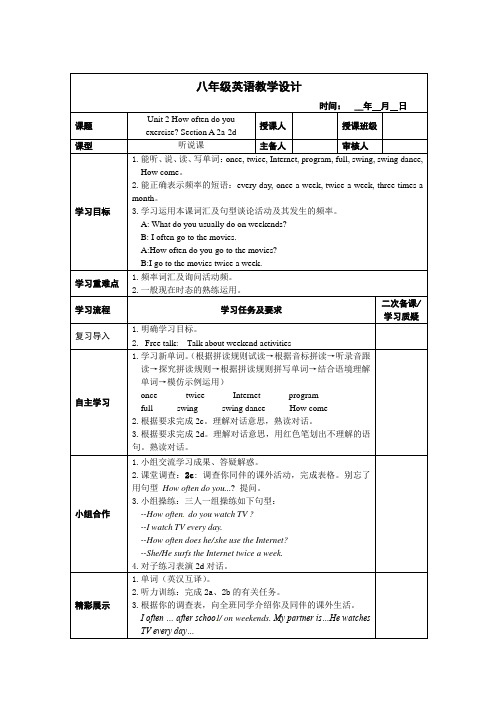
八年级英语教学设计时间: __年月日课题Unit 2 How often do youexercise? Section A 2a-2d授课人授课班级课型听说课主备人审核人学习目标1.能听、说、读、写单词:once, twice, Internet, program, full, swing, swing dance, How come。
2.能正确表示频率的短语:every day, once a week, twice a week, three times a month。
3.学习运用本课词汇及句型谈论活动及其发生的频率。
A: What do you usually do on weekends?B: I often go to the movies.A:How often do you go to the movies?B:I go to the movies twice a week.学习重难点1.频率词汇及询问活动频。
2.一般现在时态的熟练运用。
学习流程学习任务及要求二次备课/学习质疑复习导入1.明确学习目标。
2. Free talk: Talk about weekend activities自主学习1.学习新单词。
(根据拼读规则试读→根据音标拼读→听录音跟读→探究拼读规则→根据拼读规则拼写单词→结合语境理解单词→模仿示例运用)once______ twice______ Internet______ program______full_____ swing_____ swing dance_____ How come_____2.根据要求完成2c。
理解对话意思,熟读对话。
3.根据要求完成2d。
理解对话意思,用红色笔划出不理解的语句。
熟读对话。
小组合作1.小组交流学习成果、答疑解惑。
2.课堂调查:2c: 调查你同伴的课外活动,完成表格。
别忘了用句型How often do you...?提问。
人教版八年级英语上unit 2 sectionA 1a--2d教学设计教案

5.每星期三四次__________6.每月两次_________ 7.帮忙做家务_________8.钢琴课 _________
9.动物世界_________10.你最喜欢的节目 _________
(二)、根据需要填空:
1.The old man ____________(体育锻炼)every morning.
3.及时练,学生完成下面练习。
( )1.I like English very much,so I ______ listen to the tape in the morning.
uallyB.hardly everC.never
( )2.—What does your father do in the evening?
人教版八年级上Unit2sectionA教学设计
【课 题】
Unit 2 How often do you exerciseSection A 1a—2d
【学习目标】
1、熟记运用5个单词:housework、hardly、ever、once、twice
2、掌握2个句型① A: What do you usually do on weekends?
—He usually ____________.
A.watch TVB.exercisesC.read books
( )3.“____________give up,then you can be successful(成功) .”
A.AlwaysB.SometimesC.Never
( )4.I don't like milk but mother wants me _____.
Section A-2

3b Fill in the blanks in the e-mail message with the words in the box.
anything everything nothing everyone no one
Dear Bill, How was your vacation? Did you do anything ________ interesting? Did________ in the family go with everyone you? I went to a friend’s farm in the countryside with my family. everything _________was great.
一般过去时
1.定义: 1) 表示过去某个时间发生的动作或存在
的状态,常和表示过去的时间状语(如yesterday,
last night, in 1990, two days ago...)连用;
2) 也表示过去经常或反复发生的动作, 常和表示
频度的时间状语(如often, always…)连用。 有哪些时间状语可以用来描述过去?
eating anything at a restaurant? read anything interesting? Visit anyone in your family? Buy anything? Keep a diary?
Everyone Someone No one
In our group, everyone ate something at a restaurant
肯定句:主语+was (were) +宾语
如:I was late yesterday. 昨天我迟到了。 否定句:主语+was (were) +not+宾语 如:We weren't late yesterday. 我们昨天没迟到
人教版九年级上册英语课件:Unit 2 Section A(1a-2d)(共10张PPT)
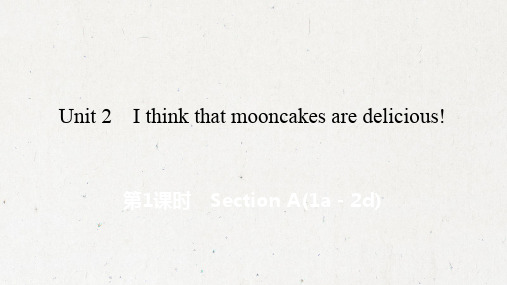
第1课时 Section A(1a-2d)
名师点睛
•词汇冲 • 1.crowded adj.拥挤的。其反关义词为uncrowded(不拥挤的)。短语:
be crowded with挤满了…… • 2.【辨析】believe与believe in。believe表示相信某人的话,而
the races.比尔和玛丽都相信他们明年还会回来观看龙舟比赛。
• 该句包含一个that引导的宾语从句,作动词believe的宾语;在宾语从 句中,to watch the races为动词不定式短语,在句中作目的状语。 【拓展】动词不定式作目的状语既可放在主句前,也可放在主句后。 放在主句之前时,要用逗号与主句隔开。例:To get high grades, he works very hard.=He works very hard to get high grades.为 了取得高分,他努力地学习。
• 9.relative n.亲属;亲戚。【拓展】relative还可作形容词,意为
“相对的;有关系的”。 • 10.throw(threw,thrown)v.扔;掷。短语:throw...at...朝……
扔……,把……洒/抛在……上。throw后接所扔的东西,at后接扔的 对象。
•难句解 • Bill and Mary believe that读they'll be back next year to watch
ut
• 5.Don't eat too much, or you'll p_________ on your weight.
• 6.【2018·浙江杭州中考】The train was vreowrydecd_____________ with passengers, so we had to stand.
人教新目标七年级英语上册Unit9SectionA1a–2d说课稿
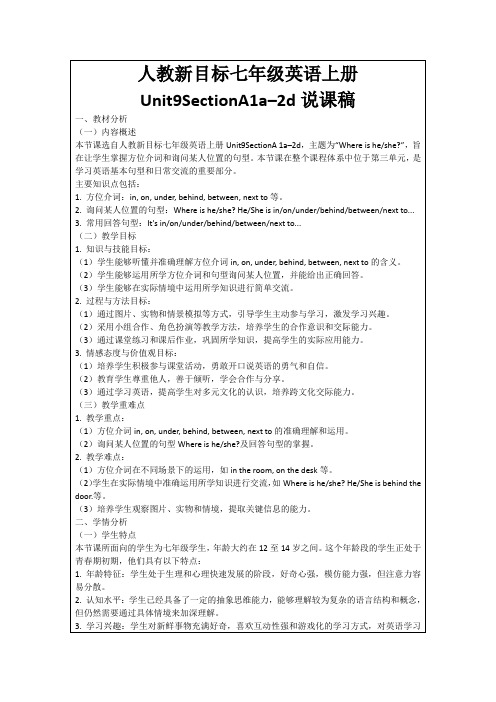
2.任务型教学法:设计一系列任务和活动,要求学生通过合作和交流来完成。这种方法的理论依据是,任务型教学能够促进学生的语言综合运用能力,提高学生的交际能力。
(三)教学重难点
1.教学重点:
(1)方位介词in, on, under, behind, between, next to的准确理解和运用。
(2)询问某人位置的句型Where is he/she?及回答句型的掌握。
2.教学难点:
(1)方位介词在不同场景下的运用,如in the room, on the desk等。
1.采用多样的互动方式,如小组竞赛和角色扮演,提高学生的参与度。
2.提供更多的实物演示和场景模拟,帮助学生直观理解方位介词。
3.鼓励学生在课后练习中尝试使用所学知识,提高实际应用能力。
课后,我将通过学生的课堂表现、作业完成情况和学生的自我评价来评估教学效果。具体的反思和改进措施包括:
1.分析学生的作业和课堂参与情况,了解他们的掌握程度和存在的困难。
(二)教学目标
1.知识与技能目标:
(1)学生能够听懂并准确理解方位介词in, on, under, behind, between, next to的含义。
(2)学生能够运用所学方位介词和句型询问某人位置,并能给出正确回答。
(3)学生能够在实际情境中运用所学知识进行简单交流。
2.过程与方法目标:
(1)通过图片、实物和情景模拟等方式,引导学生主动参与学习,激发学习兴趣。
1.让学生自己总结本节课学到的知识点,并分享在实践活动中的体会和感受。
Section A-2

Can you hang out with us tonight? 3. Inviting: _______________________________ (can/ hang out with us tonight) Refusing: _______________________________ Sorry, I’m not free. I must study for a test. Reason: ____________________________(must) 4. Inviting: _______________________________ Would you like to come to my birthday party? (would like to/come to my ________________ birthday party) Sure. I’d love to. Accepting: _______________________________
c. She had to study for a math test yesterday.
Did she have to study for a math yesterday?
Yes, she did. She didn’t have to study for a math yesterday.
go to the doctor
go to the zoo
A: Can you go to the zoo? B: Sorry, I can’t. I have to help my parents. help my parents A: Can he go to the zoo? C: No, he can’t. He has to help his parents.
人教版九年级全册Unit3SectionA2a2d说课稿
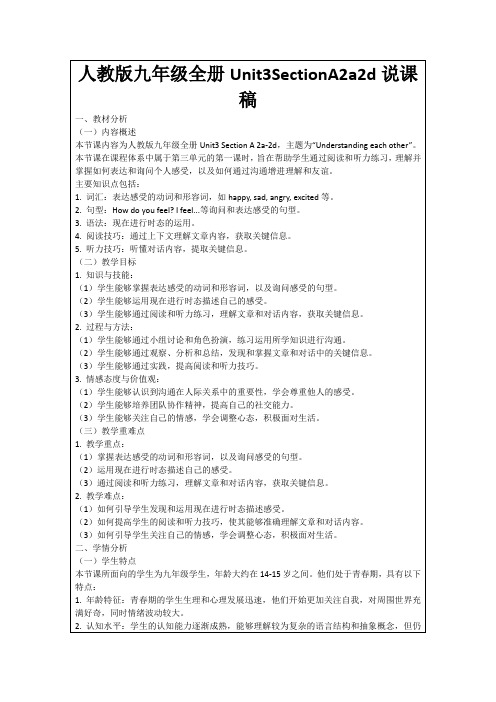
(三)巩固练习
为了帮助学生巩固所学知识并提升应用能力,我计划设计以下巩固练习或实践活动:
1.小组讨论:学生分组讨论,根据给定的情境,创造性地使用所学词汇和句型进行对话。
2.角色扮演:学生扮演不同角色,模拟真实场景中的情感交流,实践所学知识。
3.学习兴趣:学生对新鲜事物感兴趣,喜欢互动和参与性强的话题,对英语学习的兴趣往往与其实际应用和娱乐性相关。
4.学习习惯:学生已经形成了一定的学习习惯,但可能存在学习方法不当、注意力不集中等问题。
(二)学习障碍
在学习本节课之前,学生可能已经具备了以下前置知识或技能:
1.基本的英语语法知识,如一般现在时态。
(四)总结反馈
在总结反馈阶段,我会采取以下方式引导学生自我评价,并提供有效的反馈和建议:
1.自我评价:让学生自我反思本节课的学习过程和成果,评价自己在学习中的表现。
2.同伴评价:鼓励学生相互评价,提供同伴间的反馈,促进彼此的学习。
3.教师评价:根据学生的课堂表现和作业完成情况,给予针对性的评价和建议。
3.填空和改写句子练习:设计填空和改写句子的练习题,让学生在练习中巩固语法结构和词汇。
4.听力理解练习:播放听力材料,让学生回答相关问题,检验其听力理解水平。
5.个人展示:鼓励学生上台展示自己的学习成果,如用英语讲述个人感受的故事。
这些练习和活动旨在通过实际操作,帮助学生巩固知识,提高语言运用能力。
(2)运用现在进行时态描述自己的感受。
(3)通过阅读和听力练习,理解文章和对话内容,获取关键信息。
2.教学难点:
(1)如何引导学生发现和运用现在进行时态描述感受。
Section A-2

No, I don’t. I always ride my bike. ___________________________________
5. ride/their bikes/do/school/your friends/to Do your friends ride their bikes to school ___________________________________? Yes, they do. ___________________________________
--- ______ do you play football? --- Once a week. A. How much B. How long C. How often D. How far
答案:C 解析:本题是对疑问副词词组的考察, 通过答句可以判断出是询问动作发生的 频率,所以选择C。
Group work:
b. No, he doesn’t.
c. He rides his bike. d. It’s five kilometers. e. About 15 minutes.
3b
Use these words to make questions. Then ask and answer them with your partner.
1. school/you/get to/do/how ___________________________________? How do you get to school ___________________________________ I ride my bike. 2. to/school/get to/does/how long/take/it ___________________________________? How long does it take to get to school ___________________________________ It takes about five minutes.
Section A-2
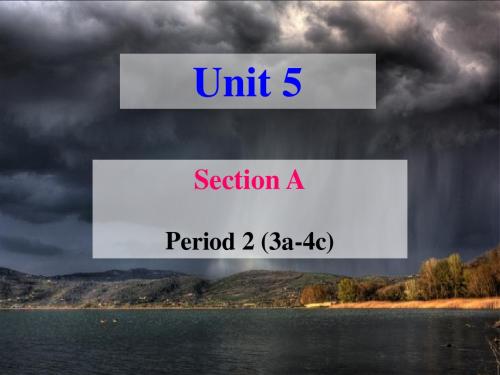
3c Discuss the questions with a partner.
“Although the storm broke many things apart, it brought families and neighbors closer together.” What other things can bring people closer together? How can we help each other in times of difficulty?
2. What was the neighborhood like after the storm? The neighborhood was in a mess. There were fallen trees, broken windows and rubbish everywhere.
Complete the sentences using 3b information from the passage. 1. When the news on TV was reported, strong winds ____________ were blowing outside.
Unit 5
Section A
Period 2 (3a-4c)
3a Read the passage and answer the
questions. 1. What was the weather like before the heavy rain started? Strong winds were blowing, and black clouds were making the sky very dark.
Do the other exercises in this part.
Unit2 SectionA (1a-2d)分层练习设计九年级英语人教版全册

Unit2 I think that mooncakes are delicious!SectionA (1a-2d)I. 单项选择:(BC层学生必做,A层选做或不做)( )1. ---Guess what? Anna has passed the exam.---____________________!A. What a good newsB. How good a newsC. What good newsD. How good news( )2. I ate a lot and did little exercise, so I ________ 10 pounds.A. put onB. put awayC. put outD. put off( )3. _________ the mooncakes are!A. How deliciousB. What deliciousC. What a deliciousD. How a delicious( )4. I believe _______ he will be back _________two years.A. what, afterB. that, inC. that, afterD. what, in( )5. On my visit to Australia, I feel Australians are similar ________us in many ways.A. withB. forC. inD. to( )6. ---I wonder _______________________.---Yes, of course.A. where we can buy the partsB. how often you hear from your sisterC. if I may have a word with youD. why he arrived late yesterday( )7. ---I’m afraid I can’t go to the meeting.---This is ____________that yo ushould attend it.A. so an important meetingB. such important a meetingC. so important meetingD. such an important meeting( )8. ----How do you like the dishes, Eric?--- Fantastic! Nothing tastes ___________.A. goodB. terribleC. betterD. more terrible( )9. ---I wonder _________Tom will come to our party.---He will when he finishes his work, I think.A. howB. whetherC. thatD. what( )10. ---Would you like to go to the ____________ with me tonight?---Sorry. I’m not interested in music.A. gardenB. concertC. restaurantD. supermarketII. 根据句意、首字母或汉语意思完成所缺单词,每空限填一词。
人教版英语九年级全册Unit 2 Section A 2a-2d 课件

3. What is the time of the Thai New Year? It is the Water Festival.
4. What did people do at the time of the year?
民族团结,和谐社会
balance and coexistence of human and nature 生态平衡,天人合一
(社会主义核心价值观)
prosperity, … , harmony, freedom, justice, patriotism, friendship …
What + a/an + adj.+ 可数n.+ (主语+谓语) !
2b but there were also downsides.
Listen again and fill in the chart.
增加(体重);
Fun activities
Downside发s 胖
Eating out
He has put on five pounds!
Shopping
He spent so much money.
He has _p_u_t_o_n_ five pounds!
Shopping
He spent so much _m_o_n_e_y_.
The Dragon Boat Festival in June
hot It’s quite ____ in June.
Wu Ming did a lot of fun activities,
初中英语人教版七年级下册unit4 section A1a--2c
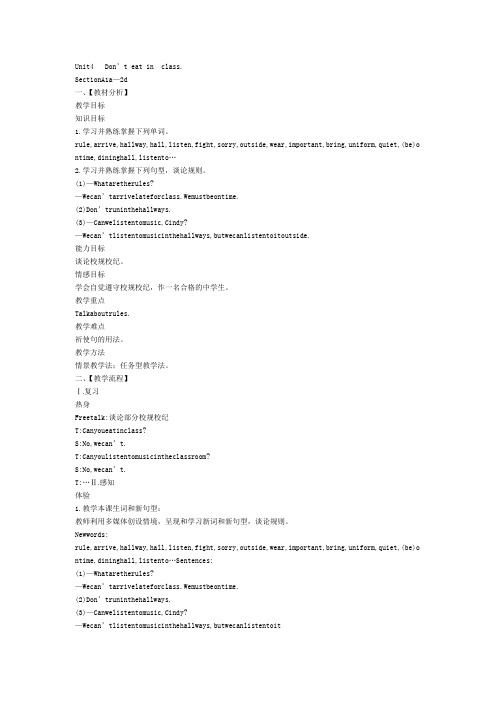
Unit4 Don’t eat in class.SectionA1a—2d一、【教材分析】教学目标知识目标1.学习并熟练掌握下列单词。
rule,arrive,hallway,hall,listen,fight,sorry,outside,wear,important,bring,uniform,quiet,(be)o ntime,dininghall,listento…2.学习并熟练掌握下列句型,谈论规则。
(1)—Whataretherules?—Wecan’tarrivelatef orclass.Wemustbeontime.(2)Don’truninthehallways.(3)—Canwelistentomusic,Cindy?—Wecan’tlistentomusicinthehallways,butwecanlistentoitoutside.能力目标谈论校规校纪。
情感目标学会自觉遵守校规校纪,作一名合格的中学生。
教学重点Talkaboutrules.教学难点祈使句的用法。
教学方法情景教学法;任务型教学法。
二、【教学流程】Ⅰ.复习热身Freetalk:谈论部分校规校纪T:Canyoueatinclass?S:No,wecan’t.T:Canyoulistentomusicintheclassroom?S:No,wecan’t.T:…Ⅱ.感知体验1.教学本课生词和新句型:教师利用多媒体创设情境,呈现和学习新词和新句型,谈论规则。
Newwords:rule,arrive,hallway,hall,listen,fight,sorry,outside,wear,important,bring,uniform,quiet,(be)o ntime,dininghall,listento…Sentences:(1)—Whataretherules?—Wecan’tarrivelateforclass.Wemustbeontime.(2)Don’truninthehallways.(3)—Canwelistentomusic,Cindy?—Wecan’tlistentomusicinthehallways,butwecanlistentoitoutside.2.Makeconversations.(1)—Don’trunint hehallways.—Sorry,Ms.Clark.(2)—Whataretherules?—Well,wecan’tarrivelateforclass.Wemustbeontime. (3)—Canwelistentomusic,Cindy?—Wecan’tlistentomusicinthehallways,butwecanlistentoitoutside.3.Makealistofschoolrules:(1)Don’tarrivelateforclass.Youmustbeont ime.(2)Don’truninthehallways.(3)Don’teatintheclassroom.Youmusteatinthedininghall.(4)Don’tlistentomusicinclass.(5)Don’tfight.Ⅲ.强化巩固1a:Whichrulesarethesestudentsbreaking?Writethenumberoftherulenexttothestudent. 学生独立完成并合作讨论答案,教师检查。
SectionA-2

在体育课上, 我们必须穿运动鞋。
Tom has to practice the guitar every day.
汤姆每天必须练习弹吉它。
I had to get up at 5:00 am last Monday.
上周一, 我不得不早上5点起床。
2) 否定形式: 主语+don’t have to+动词原形 +其他(一般现在时, 主语是第三人称单数时,
Library Rules
1. Don’t talk. 2. Don’t eat. 3. Don’t listen to music. 4. Don’t take photos.
3b. Use the words to make questions
about the rules. Be quiet?
At my dream school, we don’t have to come to school every day. We …
4. Make our school rules
Dear students: In order that we can have a good environment (环境). We should have some rules in our school. Here are some suggestions, we hope that all of us can have a look at them. 1. Don’t sleep in class. 2. Clean the classroom everyday. 3. __________________________ 4. __________________________ 5. __________________________ 6. __________________________ Yours ____
Section A-2

4. One woman in the area saw something running away, ….
“see +宾语+ doing”是指“看见某人正在做 某事”, 不是全过程, 表正在进行 I saw the boy singing. 我看到这个孩子正在唱歌。 “see +宾语+ do”是指“看见某人做某事”, 是看着事情的发生全过程 I saw her come. 我看到她来了。
【 2010 福建 · 晋江】 — Lily has a silk ______. Listen, she is singing in the next C room! — How nice! A. look B. noise C. voice 【解析】look 可数名词,意思 是“相貌, 样子,外表 ”,常用复数形式; noise 不可数名词,意思 “噪杂声,吵闹声 ”; voice是可数名词, 意思 是“嗓音,说 话声 ”。
2. … it must be teenagers having fun.
having fun 是分词短语,作定语修饰 teenagers, 相当于定语从句: who are having fun。 The man reading a novel at the desk is my father. = The man who is reading a novel at the desk is my father. 在桌边看小说的人是我父亲。
Section A Period 2 (3a — 3c)
Translate the phrases.
at the picnic belong to pop music hair band attend a concert go to a picnic pick up 在野餐 属于… 流行音乐 发带 出席音乐会;欣赏一场 音乐会 去野餐 捡起
人教版八年级英语上unit2sectionA1a2d说课稿教案

4.学习习惯:学生在学习过程中可能已经形成了自己的学习习惯,如习惯于听讲、记笔记,但可能缺乏主动探究和合作学习的能力。
(二)学习障碍
学生在学习本节课之前,可能已经掌握了一些基本的英语词汇和语法知识,如一般现在时态的运用。然而,以下学习障碍可能存在:
3.对全班学生的学习情况进行总结,指出普遍存在的问题,并提供改进的方法。
4.鼓励学生之间相互评价,促进他们互相学习和进步。
(五)作业布置
课后作业的布置情况如下:
1.听力作业:让学生回家后听英语原声材料,提高听力理解能力。
2.口语作业:要求学生与家人或朋友用英语进行对话,练习本节课所学的句型和词汇。
3.书面作业:布置一篇关于学校生活的英语作文,让学生将所学知识应用到写作中。
3.情境教学法:通过创设情境,让学生在特定的语言环境中学习,提高语言的输入和输出效果。这种方法有助于学生将所学知识应用到实际生活中。
选择这些方法的理论依据是,它们能够充分调动学生的学习积极性,促进学生的主动参与和合作,同时符合语言学习的交际性和实践性原则。
(二)媒体资源
在本节课中,我将使用以下教具和多媒体资源:
(2)培养学生合作学习、自主学习的能力,提高学生的课堂参与度;
(3)引导学生运用所学知识解决生活中的实际问题。
3.情感态度与价值观目标:
(1)培养学生热爱学校生活,积极参与学校活动的情感态度;
(2)通过学习,让学生认识到英语在实际生活中的重要性,增强学习英语的兴趣和信心;
(3)培养学生团结协作、互相帮助的精神。
2.利用情景教学法,创造一个真实的语言环境,让学生在实际语境中学习并运用新知识。
人教版九年级英语全册Unit2 SectionA(1a-2d)+课件

Listen and find out Wu Ming’s and Harry’s opinions.
Let’s listen
Wu Ming believes that Hong Kong is a good place for shopping.
Wu Ming thinks
that he ate at least five meals a day.
2.
w__i_n_d__o_w_. s
Little kids and
even
parents
_d_r_e_s_s__u_ pas
ghosts
or
black
the Spring Festival, the Water Festival, the Lantern Festival, the Drogan Boat Festival, the Mid-autumn Festival
2.learn some new words and phrases.
relative, stranger, lantern, put on , throw..at..,wash away
ห้องสมุดไป่ตู้
泼向/洒向…
throw water at each other
I wonder
the Water Festival
if(是否)
you
love
water.
--I love the water.I think that it is exciting to throw water at each other.
A. the Water Festival B . the races C. the dragon boat teams
- 1、下载文档前请自行甄别文档内容的完整性,平台不提供额外的编辑、内容补充、找答案等附加服务。
- 2、"仅部分预览"的文档,不可在线预览部分如存在完整性等问题,可反馈申请退款(可完整预览的文档不适用该条件!)。
- 3、如文档侵犯您的权益,请联系客服反馈,我们会尽快为您处理(人工客服工作时间:9:00-18:30)。
否定句
一般疑问句 情态动词+主语+be+及物动词 Must the work be finished today? 的过去分词(+by…)? 特殊疑问句 特殊疑问词+被动语态的一般 Who should be asked for help? 疑问句?
含有情态动词的主动句变为被动句时,谓语动词部分改 为“情态动词+be+及物动词的过去分词”。 改为被动语态 We can write Letters can be written letters in English. in English by us.
Are there any other rules about what should and what should not be allowed in the English club? Can you tell us?
Language points
1. Do you think teenagers should be encouraged to make their own decisions? 你认为应该鼓 励青少年自己做决定吗? make one’s own decision 意为“自己做决 定”,相当于make a decision for oneself。 例:I just want to make my own decision. 我只想能够自己做决定。
2. Parents should give teenagers chances to make their own decisions. 父母应该给青少年 自己做决定的机会。 chance (a suitable time or situation when you have the opportunity to do sth.) 可数名词,意 为“机会;机遇”,其后可接to do sth.或of sth.。若表示“做某事对某人来说是一次机 会”,其后可接for sb. to do sth.。 例:I never miss a chance to play football. 我从不错过踢球的机会。 It’s a good chance for you to meet. 这是一个你们见面的好机会。
School rules
Don’t fight with others.
= Students are not allowed to fight with others.
School rules
Don’t cheat.
= Students are not allowed to cheat.
Schoer homework tomorrow instead? Lucy’s homework be done by her Can________________________________ __________________________________ ? tomorrow instead 4.Do you think we must keep teenagers away from the Internet? must be kept away Do you think teenagers _______________ __________________________ ? from the Internet
Unit 7
Teenagers should be allowed to choose their own clothes.
Talk with your classmates about your school rules by using “students are not allowed to…”.
School rules
Don’t arrive late for school.
= Students are not allowed to arrive late for school.
School rules
Don’t run in the hallways.
= Students are not allowed to run in the hallways.
5. Parents should give teenagers chances to make their own decisions. Teenagers should _____________________________ be given chances to make their own decisions ________________________ .
Don’t wear long hair. (boys)
= Boys are not allowed to wear long hair.
School rules
Don’t sleep in class.
= Students are not allowed to sleep in class.
Grammar Focus
I don’t think sixteen-year-olds should be allowed to drive. Do you think teenagers should be encouraged to make their own decisions?
Teenagers should not be allowed to have part-time jobs. Do you think we may be allowed to take some photos if we don’t use a flash?
4c You and your friend are starting an English club. Make a list of rules about what should and should not be allowed.
A: Members should be allowed to use dictionaries. B: Yes, but they should only use English-English dictionaries.
societies, it is not common for teenagers to move ________(move) out. Chinese parents believe that it is better for children to live with parents who can _____(take) care of them. But the take young should then look after their parents as they get older. That is why many Chinese adults ________(continue) to live with their parents. continue
I agree. They aren’t serious enough. No, I don’t agree with this. Teenagers are too young to make their own decisions. I disagree. They can learn a lot from working. If you don’t use a flash, then it may be OK.
School rules
Don’t eat in the classroom.
= Students are not allowed to eat in the classroom.
School rules
Don’t listen to music in the classroom.
= Students are not allowed to listen to music in the classroom.
4b Fill in the blanks with the correct forms of the words in brackets.
Should teenagers __________(ask) to move be asked out when they start working? In many Western countries, teenagers ____________(allow) to are allowed move out at eighteen. Their parents believe that they should ____________(educate) to take care be educated of themselves from a young age. This way, when they _______(start) working they can manage start their own lives. However, in most Asian
2.一般现在时被动语态的基本用法
用法
表示经常性或习惯 性发生的被动动作
表示近期正在发生 的被动动作 描述某种常态化的 被动的客观事实 强调目前存在的针 对行为主体人的被 限制性动作
示例 I am often asked the question by my pupils. These days people are moved by a teacher named Zhang Lili. The spaceship is mainly controlled by computer. You aren’t allowed to take photos.
4a Rewrite the sentences according to the example.
1. You must clean your bedroom every day. Your bedroom must be cleaned every day . 2. Parents should encourage teenagers to do social work for their community. Teenagers _____________________________ should be encouraged to do social work for their communit _____________________________ .
